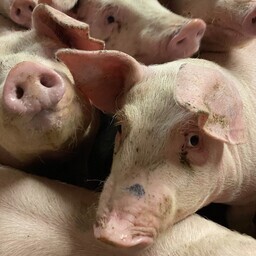PTA kehtestas talule kitsendused. See tähendab, et talu ei tohi
sigu transportida
ega uusi juurde tuua. Samuti on
rangid reeglid
inimeste ja sõidukite liikumiseks.
sigu transportida
Tõlge fraasile: sigu transportida
EN
transport pigs
rangid reeglid
Tõlge fraasile: rangid reeglid
EN
strict rules
PTA palub kõigil mõista olukorda ja
anda ametnikele rahu tööd teha
. Laboriuuringud kinnitasid sigade Aafrika katku 13. augustil. Proovid võeti haiguste tõttu. Kõik talus elavad sead
hukatakse
.
anda ametnikele rahu tööd teha
Tõlge fraasile: anda ametnikele rahu tööd teha
EN
give officials peace to work
hukatakse
Tõlge fraasile: hukatakse
EN
will be culled
PTA korraldab farmi täieliku puhastuse ja desinfektsiooni. Pärast seda saab ruume uuesti sigadega kasutada. Hukatud sigade eest saab
taotleda kompensatsiooni
.
taotleda kompensatsiooni
Tõlge fraasile: taotleda kompensatsiooni
EN
apply for compensation
Amet rõhutab, et
taudipunkti alale
võivad siseneda ainult PTA poolt lubatud isikud. Vastutustundlik käitumine vähendab riske Eesti seakasvatusele. Farmi ümbruses võib liiklus olla häiritud.
taudipunkti alale
Tõlge fraasile: taudipunkti alale
EN
to the outbreak area
Viimati
tuvastati sigade Aafrika katk
14. augustil Põlvamaal. Seal elas 6700 siga. Sellisel aastal on kaheksas kohas tuvastatud üle 26 150 nakatunud sea. Viirus levib haigestunud loomade ja saastunud esemetega.
tuvastati sigade Aafrika katk
Tõlge fraasile: tuvastati sigade Aafrika katk
EN
African swine fever was detected
Kõik sigade Aafrika katku puhangud Eestis on alguse saanud suvel, juunist septembrini. See on seapidajatele kõige ohtlikum aeg. Loomade tervist tuleb pidevalt kontrollida ja taudikahtlusega pöörduda loomaarsti või PTA poole.
PTA has imposed restrictions on the farm. This means that the farm cannot transport pigs or bring in new ones. There are also strict rules for the movement of people and vehicles.
PTA asks everyone to understand the situation and allow officials to work in peace. Laboratory tests confirmed African swine fever on August 13. Samples were taken due to diseases. All pigs living on the farm will be culled.
PTA will organize a complete cleaning and disinfection of the farm. After this, the premises can be used for pigs again. Compensation can be claimed for culled pigs.
The agency emphasizes that only persons authorized by PTA can enter the quarantine area. Responsible behavior reduces risks to Estonian pig farming. Traffic around the farm may be disrupted.
The last case of African swine fever was detected on August 14 in Põlva County. There were 6,700 pigs living there. So far this year, over 26,150 infected pigs have been detected in eight locations. The virus spreads through infected animals and contaminated objects.
All outbreaks of African swine fever in Estonia have started in the summer, from June to September. This is the most dangerous time for pig farmers. The health of animals must be constantly monitored, and in case of disease suspicion, contact a veterinarian or PTA.

